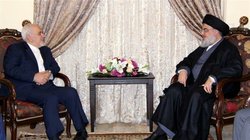 The Secretary General of the Lebanese resistance movement Hezbollah, Sayyed Hassan Nasrallah, has expressed his support for Iranian Foreign Minister Mohammad Javad Zarif in the wake of sanctions imposed by the administration of US President Donald Trump on him.
The Secretary General of the Lebanese resistance movement Hezbollah, Sayyed Hassan Nasrallah, has expressed his support for Iranian Foreign Minister Mohammad Javad Zarif in the wake of sanctions imposed by the administration of US President Donald Trump on him. RNA - “When the US administration announced sanctions against you and included you in the honor list, my brethren and I decided to send you a telegram expressing our solidarity and respect. However, I preferred to delay it until today, until August 14, when the resistance front in Lebanon defeated (the United States of) America and Israel in the 33-day war of summer 2006, with the full support of the Islamic Republic of Iran,” Nasrallah wrote in a letter addressed to the top Iranian diplomat on Wednesday.
He added, “In that unjust war and open act of aggression, the decision was American. The project was American… The Israeli military was used as an executive tool as they claimed it was the most powerful army in the region at the time.”
“In that war, John Bolton, then the US ambassador to the UN Security Council, told an Arab official: "There is no room for diplomacy, because the war will stop only if Hezbollah is crushed or it surrenders."
“But a few weeks later, Bolton told the same Arab official: "We have to stop the war now."
“The Arab official asked him: Did you crush Hezbollah? He said no. The Arab official asked: Did Hezbollah surrender? He said no. the Arab official said: So why did you stop the war?! Bolton said: Israel would suffer a major disaster if the war continues,” the Hezbollah chief pointed out.
Nasrallah further noted that Bolton, who is now the US national security adviser and threatens to overthrow the Islamic establishment in Iran, has not managed to score any victory throughout his life.
“In the year 2006, America was defeated in the face of the resistance front of a small country divided on itself. How could it now stand against a great regional state, a united nation, a coherent establishment and a great leader?” the Hezbollah secretary general underscored.
“They wanted to besiege you and sideline you. Your presence, nevertheless, became stronger, more influential and more significant. God bless you,” Nasrallah concluded.
In separate statements on July 31, the US departments of State and Treasury announced the imposition of sanctions against Zarif because he “acted or purported to act for or on behalf of, directly or indirectly, the Leader of the Islamic Republic of Iran.”
Back on June 24, Trump announced new sanctions against Iran, targeting Leader of the Islamic Revolution Ayatollah Seyyed Ali Khamenei and top commanders of the Islamic Revolution Guards Corps (IRGC).
In his statement on Zarif’s designation, US Secretary of State Mike Pompeo claimed that the top Iranian diplomat is a “key enabler” of Iran’s policies throughout the region and the world.
The US Treasury Department also said in its statement that Zarif is Iran's "primary spokesperson around the world," and that the ban "is sending a clear message that Iran's "recent behavior is completely unacceptable.”
The European Union has regretted the US decision, stating that it intends to keep working with the Iranian foreign minister.
“We regret this decision, and from our side, we will continue to work with Mr. Zarif as Iran's most senior diplomat, and in view of the importance of maintaining diplomatic channels," said Carlos Martin Ruiz de Gordejuela, the spokesman of the European Commission for the international cooperation and development.
Moreover, Deputy Permanent Representative of Russia to the United Nations, Dmitry Polyanskiy, slammed the US move to impose sanctions on Zarif, arguing that the measure will block the way for any dialogue.
According to Press TV, Polyanskiy described sanctions as against diplomacy, stressing that Moscow is against any type of bans, as they do not help find a solution.
About 1,200 Lebanese, most of them civilians, lost their lives during Israel’s 33-day war on Lebanon back in the summer of 2006.
According to a 629-page report of the Winograd Commission, appointed by the Israeli regime itself, Hezbollah fighters involved in defending Lebanon against the Israeli war defeated the enemy, and Tel Aviv was compelled to withdraw without having achieved any of its objectives.
The commission was formed in the wake of public criticism and protest over the fact that the Israeli military had effectively lost the war by failing to achieve its aim of freeing two soldiers captured by Hezbollah fighters.
UN Security Council Resolution 1701, which brokered a ceasefire in the 2006 war, calls on Israel to respect Lebanon’s sovereignty and territorial integrity.
847/940